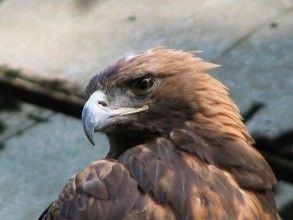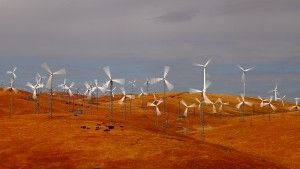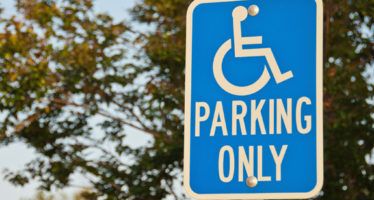Unions, environmentalists clash over wind farm
Usually reliable allies for three liberal causes – renewable energy, environmental protection and labor unions – clashed recently over whether to grant a three-year extension for a wind farm in the Altamont Pass on the eastern fringe of the Bay Area.
The Alameda County Board of Supervisors approved the extension for 828 wind turbines, despite concerns that they have killed thousands of birds, including golden eagles, over the past decade. According to a staff report, an additional 1,692 to 1,847 birds could be killed – including 15 golden eagles, 82 red-tailed hawks, 108 American kestrels and 142 burrowing owls – before the turbines are replaced with safer, more efficient models in late 2018.
Altamont Winds Inc. officials deny that its turbines are the sole cause of the bird deaths. They told the supervisors at the March 24 hearing that many fatalities may have been caused by rodent poison put out by the California Department of Water Resources.
Company officials also contend that mitigation measures, such as retrofitting PG&E power poles to prevent bird electrocution, along with the health benefits of wind power, will actually result in the saving of birds, including a net benefit of five or more golden eagles that might otherwise have perished if not for the wind farm.
But the dozens of environmental activists and bird lovers who spoke at the meeting weren’t buying those arguments.
Environmentalists speak out against wind farms
“For years when I’ve gone past there, my heart has been broken when I’ve known about the piles of birds that have been massacred underneath those wind turbines,” said Nancy Friedman, who described herself as an environmental activist, passionate birder and union supporter. “I passionately believe in wind turbines. But there has to be a better way. The horrible siting of those turbines originally and the number of birds they have killed, that has to be stopped.
“The company talked about various mitigations they have put in place. Why were those mitigations not in place years ago? Why didn’t they figure out how to stop the massacre of those birds years ago? We now have better choices with improved technologies. It’s time to stop the killing now, not in another two or three years when another thousand of these fantastic creatures are murdered.”
That sentiment was echoed by Nancy Weninger, who is the conservation chair of the Mt. Diablo Audubon Society.
 “My father had a saying: fool me once – shame on you, fool me twice – shame on me. AWI already fooled you once obtaining a two-year extension in 2013, agreeing to shut down all of its turbines by the end of this year. They have made no significant progress toward repowering [with next-generation windmills]. And now they want to fool you twice by seeking another extension until 2018.
“My father had a saying: fool me once – shame on you, fool me twice – shame on me. AWI already fooled you once obtaining a two-year extension in 2013, agreeing to shut down all of its turbines by the end of this year. They have made no significant progress toward repowering [with next-generation windmills]. And now they want to fool you twice by seeking another extension until 2018.
“They have known for almost 10 years that they would need to shut down and replace their old turbines. In the meantime the birds have been paying the ultimate price. Hundreds of golden eagles, burrowing owls, American kestrels and red-tailed hawks have died while AWI dragged its feet on repowering and continued to profit from their old turbines.
“Please don’t let them fool you again. Granting them another extension would be two giant steps backward in the county’s efforts to make the APWRA [Altamont Pass Wind Resource Area] a model for safe, green energy.”
Unions favor turbine extension
While most speakers were opposed to the extension, several labor union representatives argued for it, pointing out that the repowering will create union jobs.
“We have just come out of a major recession; thousands of our members out of work; home foreclosures; strong economic difficulty,” said Andreas Cluver, representing the Alameda County Building and Construction Trades Council. “It’s projects like these that are going to put the people back to work. We still have significant unemployment. We are looking for you to re-permit this to provide the opportunity for those members to work.”
That argument was countered by Tara Mueller, representing the state attorney general’s office, who said there is “no substantial evidence that there would be jobs that would outweigh significant and unavoidable adverse environmental impacts of this extension. …
“Removal of these turbines in 2015, as required by the current AWI permits, will actually result in faster repowering, which will result in more efficiently produced renewable energy and more jobs. This repowering has all the same economic and environmental benefits as the old turbines without the unacceptably high cost to wildlife and avian resources.”
 Also weighing in against the project is the United States Fish and Wildlife Service. Wrote USF&WS agent Jill Birchell in Feb. 19 letter to the county:
Also weighing in against the project is the United States Fish and Wildlife Service. Wrote USF&WS agent Jill Birchell in Feb. 19 letter to the county:
“The Bald and Golden Eagle Protection Act prohibits a variety of actions with respect to eagles, including unauthorized ‘take.’ Since January 2010 … approximately 31 unpermitted eagle fatalities have been recorded at AWI in the Altamont Pass Wind Resource Area. Although companies are not legally required to seek or obtain an eagle take permit, the take of an eagle without a permit is a violation of the Eagle Act, and could result in civil or criminal prosecution.
“The Service continues to recommend that Alameda County … enforce AWI’s current permit requiring removal of its 828 existing wind turbines by Oct. 31, 2015. To do otherwise will likely result in more eagles being killed by AWI’s turbines, further increasing AWI’s liability and possibly subjecting the County to increased scrutiny for having approved the CUP [conditional use permit] extension proposal.”
Extensive regulations to blame?
AWI officials blamed California’s extensive environmental regulations for delaying the repowering project.
“The process to obtain interconnection rights has prevented us from repowering as soon as we would like,” said AWI legal counsel Ashley Brown. “AWI has been working with the Cal ISO [California Independent System Operator] since 2012 to secure transmission and interconnection rights after repowering. We were ahead of schedule, only to be faced with the realization in 2014 that we would have to follow the two-year cluster study process, which won’t be complete until 2016.
“Repowering is a complex process. And the Cal ISO interconnect study is only one step. Repowering is much more than taking down old wind turbines and putting up new ones. It is basically developing a brand new project.
“Just like building a brand new wind farm, repowering requires new land leases, permits, environmental studies, wind studies, project engineering, new power purchasing agreements, wind turbine procurement and construction, among other tasks. However, we are on schedule to repower in 2018.”
But the company might have to pack up and leave if it’s not granted the three-year extension, warned AWI President Rick Koebbe. “I’m not going to say it’s impossible, but it would be very difficult to do,” he said. “Just because the staff that I’m using for repowering is the staff I’m using to operate the wind farms. So if there’s no revenues after this year, most of the staff would have to go away.”
Benefits of wind power
Koebbe concluded his presentation to the board by touting the benefits of his operation.
“The benefits of this wind project include $100 million in economic benefits, about 40 high-skilled jobs, 75 union jobs,” he said. “Our clean wind power displaces/avoids 609 million pounds of greenhouse gas and toxic air pollutants. There we save and avoid $12 million in health costs, including premature death, heart attacks and asthma.
“We save over 950 birds, including a net five more eagles. And mitigation is more than sufficient to account for the potential impacts, including over $16.5 million in mitigation costs that we’ve spent so far since 2007. We’re a small business based in Alameda County. We want to continue to provide the climate, environmental and economic benefits of clean wind power through 2018 until repowering.”
The three supervisors who approved the extension echoed Koebbe’s remarks. Supervisor Richard Valle said he sides with jobs over birds. Twenty-three of AWI’s employees have 27 children, he said, basing that on a 1.2 child-per-parent ratio.
“Not too many people spoke for those children,” he said. “Their mothers and fathers lose their jobs if AWI does not get their permits. Those are important numbers. I care about the environment, jobs, people, clean water. As of now my office has received over 75 emails, letters and phone calls from constituents asking us to save birds and golden eagles in the Altamont. Very few calls have come in about saving these children’s parents’ jobs.”
Cause of death skeptics
Supervisor Nate Miley spoke for 15 minutes defending the three-year extension for AWI’s wind farm. He’s skeptical that the turbine blades are causing bird deaths.
“I think everyone agrees that wind power is a good thing,” Miley said. “I don’t think there’s any disputing that. So what people are saying is that AWI is responsible for the avian mortalities. And I just find that incredulous. Because even when the turbines are turned off [in the winter], the birds are still dying. So I don’t understand why folks are putting all of that responsibility on AWI. It baffles me.
“I’ve been on the side of supporting environmental issues. But I’ve also been on the side of supporting labor. I respect people’s right to advocate for their positions. I have a responsibility as an elected official to try to balance the equities and look at what I think is in the public good. And if I can’t make a determination that a company is responsible for all of the bird deaths that folks seem to attribute to them, it’s like you’re playing me for a fool. And I’m not going to be anybody’s fool.
“Wind power is a clean source of energy, and it’s green energy. I think some people would like to see us magically go from where our society is to a society that’s perfect, pure and no problems. I’d like to see that in the city of Oakland where we don’t have any pathologies or shootings or muggings or anything like that. When my constituents who live in east Oakland can take the bars off their windows and feel comfortable walking the streets at night and in the evening. I’d like to wave a magic wand and make that happen. But we’ve got to get there incrementally.”
Wilma Chan, one of the two supervisors who voted against the extension, believes AWI has been too slow to fix its problems.
“I’m not trying to point a finger at AWI,” she said. “I don’t know the number of bird deaths. But I think everyone in this room does agree that repowering is an acceptable practice in reducing bird deaths. I would have preferred if we were going to extend, that we do it for a shorter period of time. Because I don’t think there’s been enough progress. This has been going on for 10 years.”
Campaign contributions
The supervisors who voted for the extension may have been influenced by campaign contributions, according to a Contra Costa Times article. Since 2006 AWI has contributed $19,750 to board chair Scott Haggerty, $5,306 to Miley and $764 to Valle. The supervisors and a company official denied any connection between the contributions and the extension approval.
Related Articles
California’s fracking opportunity
In 1973, President Richard Nixon launched Project Independence, an effort to make the United States energy independent by 1980. The
Auditor spurs calls to combat disabled-parking spot abuse
SACRAMENTO – California has nearly 25 million passenger vehicles, yet hands out a whopping 2.9 million disabled-person parking plates and
NV beats CA for another electric car plant
After losing out to Nevada last year in the competition for Tesla’s battery plant, California has missed a similar opportunity. Faraday





